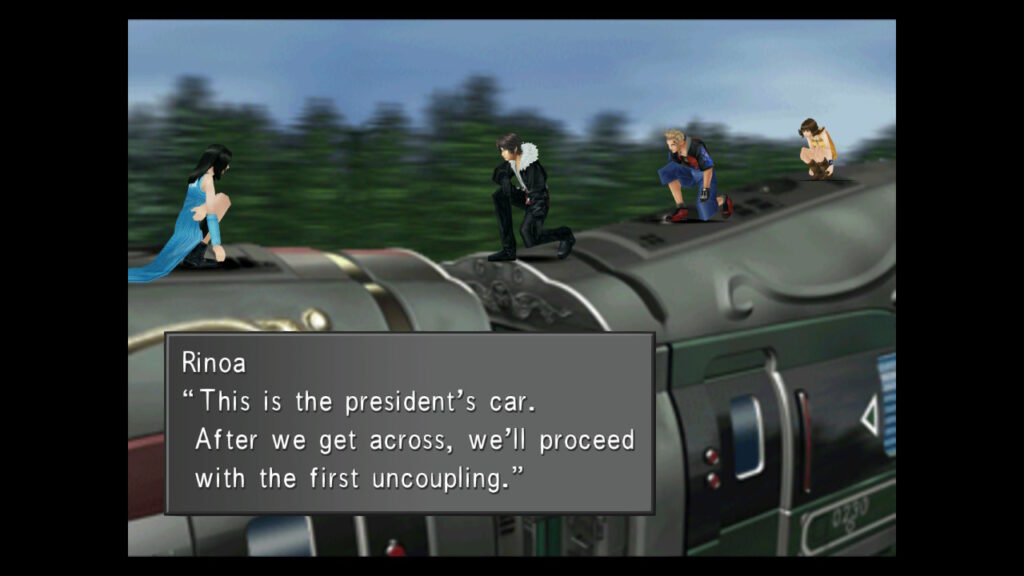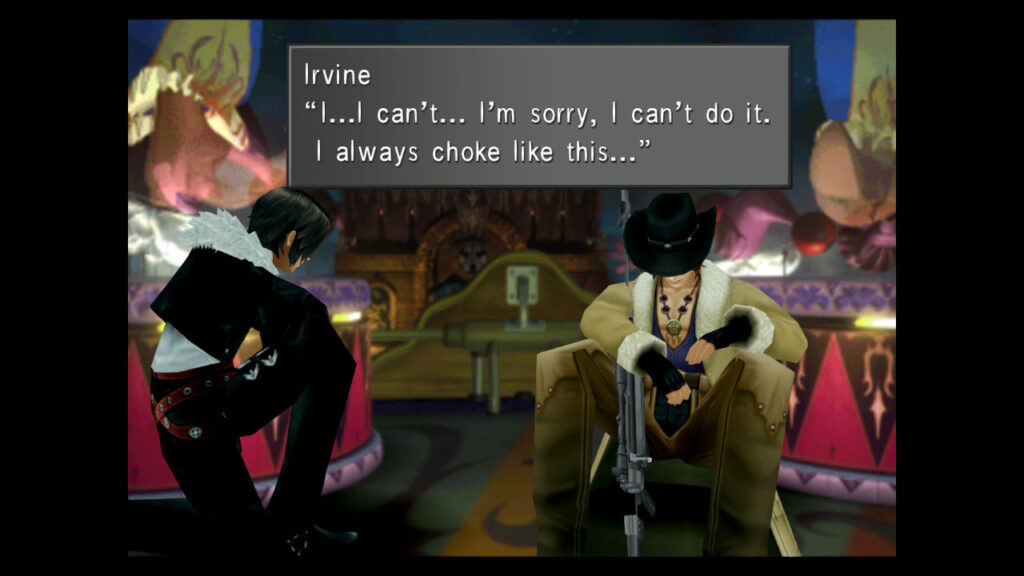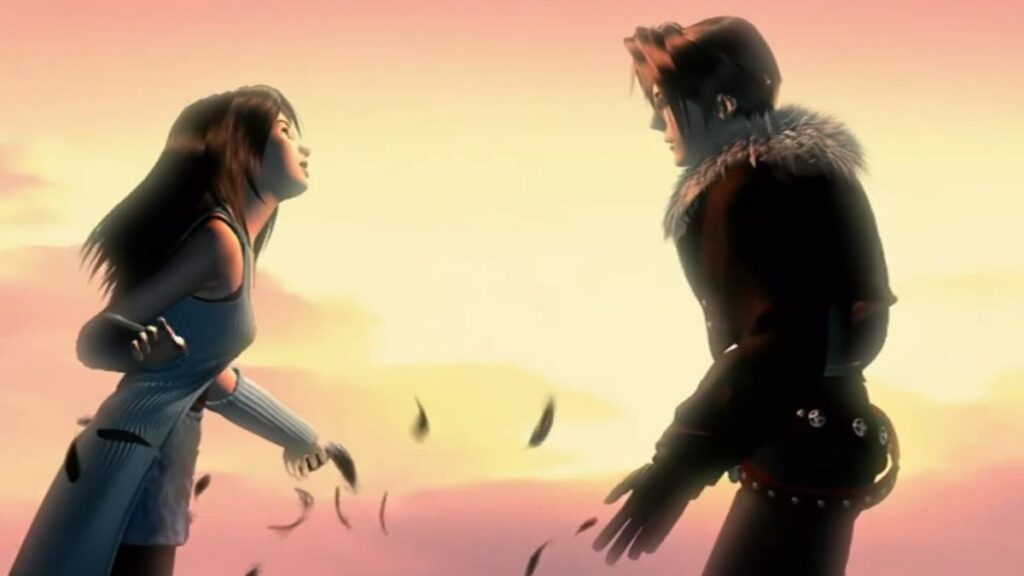Final Fantasy VIII is a great video game. It brought plenty of technological advancements over the iconic Final Fantasy VII, like “detailed” character models during exploration, minimalist HUD elements inside combat, pre-rendered cutscenes merged with actual gameplay, and a superb evolution in terms of sound, boasting themes with vocals and high-quality audio. This technical marvel had its cost though, and Final Fantasy VIII had one of the highest budgets in the industry by the time of its release, giving a sign to how RPGs were about to become inconceivable projects in the near future.
Aside from the technical achievements, however, Final Fantasy VIII struggled. The interesting Junction System seemed overly convoluted to please a wider audience, the plot was a mess, mixing some interesting modern elements with medieval fantasy, but lacking a narrative to really tie it all together without sounding like some cheesy teen wet dream of conveniences and terminologies. It is perhaps the most “japanese” of the Final Fantasies, and that means inheriting a lot of anime tropes, from the one-line characters to a setting with real issues in conceiving warfare while also maintaining a teen-romance and typical high-school cliches.
The School
Let’s start with the minor issue at hand: The Gardens and their place in this world. In theory, the Gardens are supposed to be schools dedicated to forming elite mercenaries who will be dispatched to missions around the globe to help governments, rebellions, and the like. It is akin to a military institution raising soldiers for war. Yeah. It’s pretty awesome in a fantasy world with magic and massive beasts, right?
There’s a big problem though. The narrative of the game gives us a completely different Garden from that initial thought. Instead of forming students through discipline, order, and respect for superiors, like any mercenary soldier would, the school instead seems too much like a typical japanese high-school, which we can see at thousands in modern day anime. They think of festivals, they hang at the cafeteria, they wander around, they are super happy all the time, etc. They never look like people who are being taught to obey the chain of command and facing imminent doom. Anyone who has some knowledge about a military academy, school, or institution (or even a religious one) will certainly notice the Garden is NOTHING like that.

The Students
This brings us to the bigger issue: the cast. Although Squall evolves quite a lot in the game and seems more fit for a military organization, everyone else does not. The group never looks like operatives acting under command of an elite organization. They look like regular teens who never had to face danger in life and were never even prepared for that. In fact, when faced with real danger, these characters almost always act as if there is nothing happening at all, neither becoming scared nor pumped. Irvine being the sole exception during the final mission of the first half of the game.
The behavior of the party is the same as in most other characters running around the Gardens scattered across the game. They are thinking of anything BUT obeying a chain of command, respecting teachers, and the like. The only thing they do resembling that is their salute. This brings down any attempt of making the game look tragic, serious, or tense. The cast cannot put that into actions or dialogues. It is a major difference from the earlier Final Fantasy VII, where each character had a lot to tell us and felt a lot about the world. Final Fantasy IX was even bigger in that regard. It feels weird how the eighth entry is utterly bland in giving depth and coherence to its main cast and even to support characters.

And there’s a lot of ass-pulling
Well, I cannot say the game completely lacks attempts at character development, it does try. However, it tries too hard for its own good. Every element trying to band the group of typical teenagers together is an absurd coincidence or comes out of thin air. Squall and Rinoa meet each other, suddenly everyone is trying to put the two together and you have basically just a few lines to tell how Rinoa was in love with Seifer, or how everyone else simply decided that Squall and Rinoa were fit for each other. It ends up as a superficial teen romance forced upon the game where everything happening is completely NUTS.
Yeah. NUTS.
The most aggravating ass-pull in this game is the orphanage, which at a random point becomes the pivotal element of the tale out of thin air. It is really damn weird. You run into Trabia Garden, destroyed by missiles, and as you wander around, Irvine prompts that everyone was part of the same orphanage and… BANG! Everyone starts talking about that, using the excuse of memory damage due to use of Guardian Forces. Hell yeah. After nearly dying multiple times, being captured, tortured, trying to assassinate a major political figure, helping random rebels, and waging war against a nation, NOW they suddenly remember they all knew each other from childhood.
From there on the game becomes a trip to anything you could imagine: go the moon? Ok. Time travel? Well, you had that already. Multiple evil sorceress traveling through time? Yup. The moon bleeding out monsters!? Sure! Super-high tech nation? Certainly. The fan theory of Squall dying at the end of disk 1 always felt like the best excuse for the insanity that comes after.

No other main Final Fantasy did that
Final Fantasy Type-0 got back with the school element, but the major entries never tried to veer so much into anime tropes as the eighth entry did. In a way, the not-so-positive feedback the game had is, in part, a consequence of those choices, which really didn’t resonate well with the players back in the 90’s. Today it could get a better niche reception, but that was never what the series was about.
For me, however, it was not the anime tropes that made the game feel lacking, but the consequences of it in the cast. Although Squall is an interesting protagonist, everyone else is so simple and underdeveloped it feels wrong after playing Final Fantasy VII. There is no deeper dig into everyone’s tale because of the ass-pulled orphanage, which renders everyone’s past into one single element. No one got much to tell besides simple one-liners. Seifer is a bully, Zell is a loudmouth, Selphie is happy, Irvine is a womanizer, Quistis is serious, and Rinoa is nothing because her past is not even part of the orphanage and so we get nothing on her besides the random mumble-jumble about the supreme witch and time compression. That’s sad. Cloud had such a crazy background, Yuffie got all that sidequest to tell about her past as did Vincent, Red XIII had an entire town to trace his origins, and so on. Everyone in Final Fantasy VII had more to tell, and characters usually do in Final Fantasy games.
This crazy game can win points with its craziness along with all the technical achievements and superb production, but when put in comparison to others of the franchise it becomes understandable that it sits either as one of the least loved Final Fantasies or the only one within the franchise a person can like. Final Fantasy VIII may be a Final Fantasy, but not as any other.
